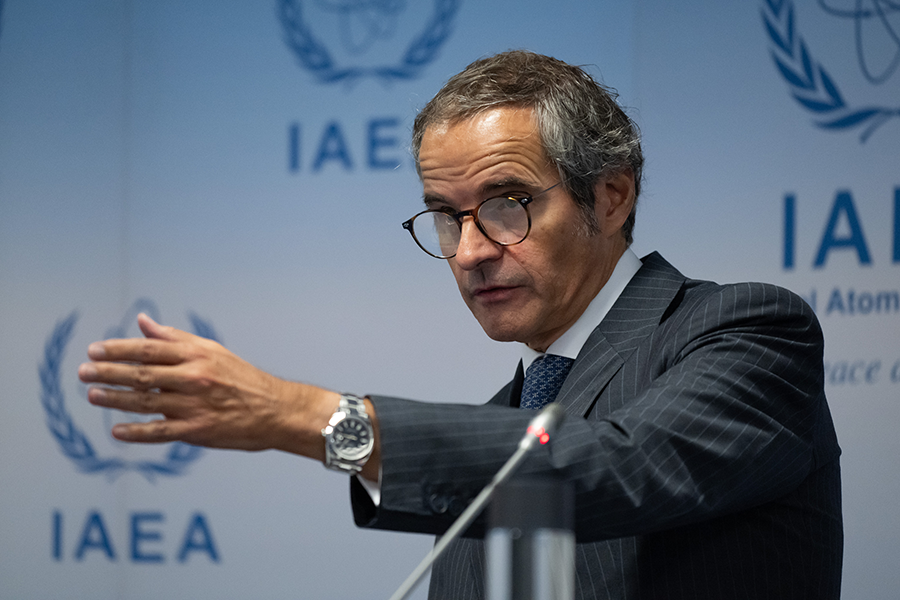"I find hope in the work of long-established groups such as the Arms Control Association...[and] I find hope in younger anti-nuclear activists and the movement around the world to formally ban the bomb."
IAEA Reports No Progress on Iran Probe
October 2023
By Kelsey Davenport
A group of states rebuked Iran for failing to meet its legal safeguards obligations and threatened to pursue further action against Tehran if it does not cooperate with inquiries from the International Atomic Energy Agency (IAEA).
 France, Germany, the United Kingdom, and the United States accused Iran of persisting in its “deliberate refusal to engage earnestly” with the IAEA in a Sept. 13 statement, issued during the agency’s Board of Governors meeting. The states said the board must be prepared to take further action to support the IAEA and “hold Iran accountable” if Tehran does not fulfill its safeguards obligations.
France, Germany, the United Kingdom, and the United States accused Iran of persisting in its “deliberate refusal to engage earnestly” with the IAEA in a Sept. 13 statement, issued during the agency’s Board of Governors meeting. The states said the board must be prepared to take further action to support the IAEA and “hold Iran accountable” if Tehran does not fulfill its safeguards obligations.
One of the safeguards issues the four states noted is Iran’s failure to provide technically credible answers to IAEA questions about processed uranium that inspectors detected at two locations in 2019 and 2020. The presence of the uranium particles and the IAEA analysis suggest that Tehran should have declared these locations to the agency under its legally required safeguards agreement. The agency analysis suggests that the illicit activities involving uranium took place prior to 2003, when Iran’s organized nuclear weapons program ended.
The statement came after IAEA Director-General Rafael Mariano Grossi raised concern about the “routinization” of the Iran case during a Sept. 11 press conference and said there is a “decrease in interest” from member states regarding the outstanding issues. Grossi said the agency’s issues with Iran are “as valid today as they were before.”
The board has already passed three resolutions, most recently in November 2022, urging Iran to cooperate with the agency. The board has not taken any action since then.
Iran committed in March to “resolve the outstanding safeguards issues” and provided answers regarding a third site in May, but Grossi said on Sept. 11 that there has been no progress on that pledge over the past three months. He said Iran must provide the agency with “technically credible explanations for the presence of uranium particles of anthropogenic origin at Varamin and Turquzabad.” Grossi said this issue must be resolved for the IAEA to “provide assurance that Iran’s nuclear program is exclusively peaceful.”
Evidence analyzed by the IAEA suggests that Iran conducted activities related to uranium milling and conversion at Varamin prior to 2003 and stored equipment from its pre-2003 illicit activities at Turquzabad.
Iran disputed the IAEA assessment that there was no progress on the March commitment over the past quarter.
Mohsen Naziri Asal, Iranian ambassador to the IAEA, said that the report “could have been better and presented to the Board of Governors in a manner that more accurately reflects the existing realities.” In a Sept. 13 interview with Iran Nuances, he said that Tehran has had “numerous discussions” with the IAEA that demonstrate that Tehran can “resolve issues through a highly constructive and positive engagement with the agency.” Iran is committed to addressing agency questions about the two sites, he said.
An IAEA report on Sept. 4 noted that Iran told the agency in June that it “exhausted all efforts” to determine the origin of the uranium particles and again suggested that the sites may have been contaminated with uranium as an act of sabotage.
During an Aug. 28 meeting with the IAEA in Tehran, Iran said it had “collected additional information” about the dismantled storage containers present at Turquzabad that were removed from the site prior to a visit by IAEA inspectors. Iran said it would provide the agency with that information. The IAEA requested to receive it as soon as possible.
Eight states, including China and Russia, issued a statement supporting Iran’s position. It welcomed Iran’s continued cooperation with the IAEA and said the remaining issues should be resolved in a “depoliticized manner without interference from the outside.”
In a separate statement, 63 states underscored the “urgent need” for Iran to provide “technically credible” answers to the IAEA’s questions.
The IAEA was investigating two other locations never declared as part of Iran’s nuclear program, but the agency ended those inquiries.
The agency concluded in May 2022 that, at one of the sites, Lavisan-Shian, Iran conducted activities related to uranium metal that should have been declared.
